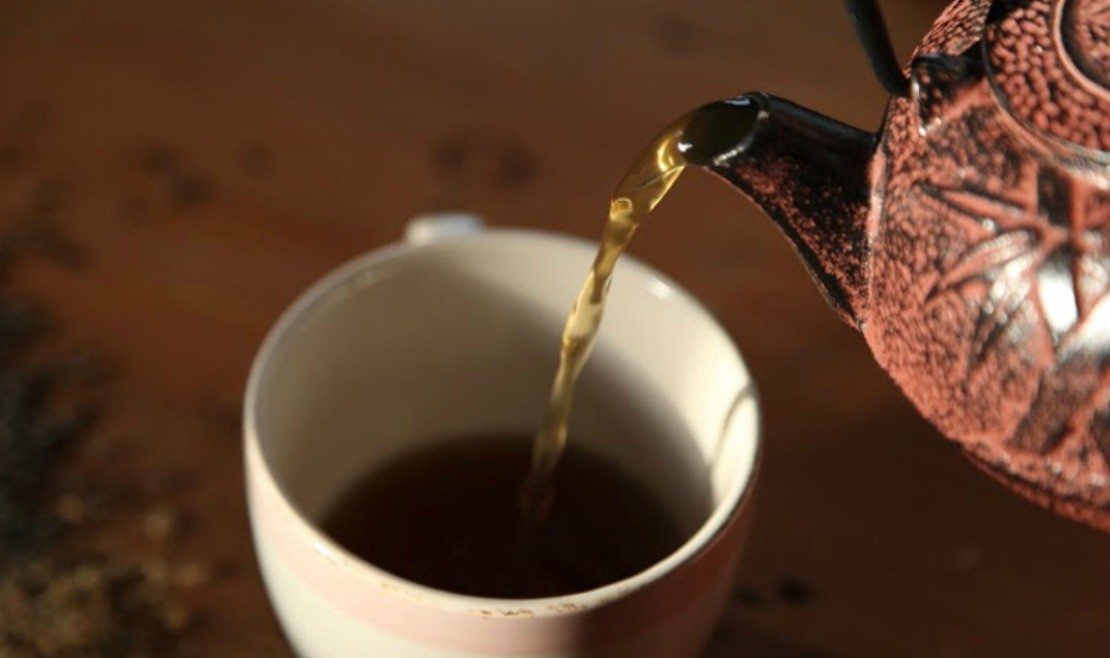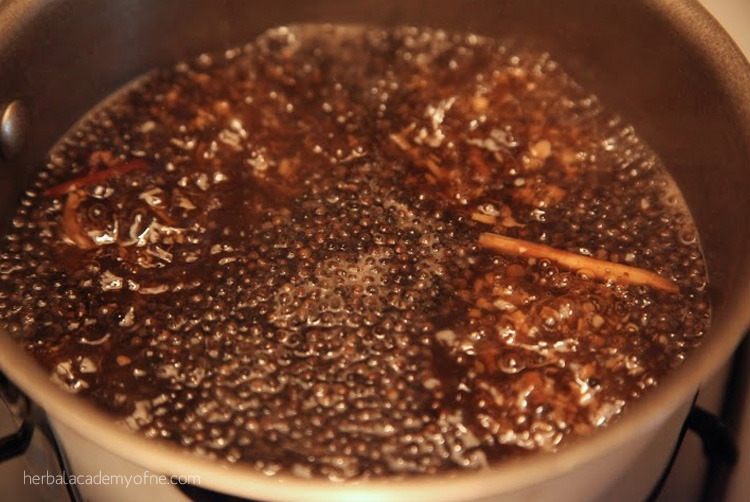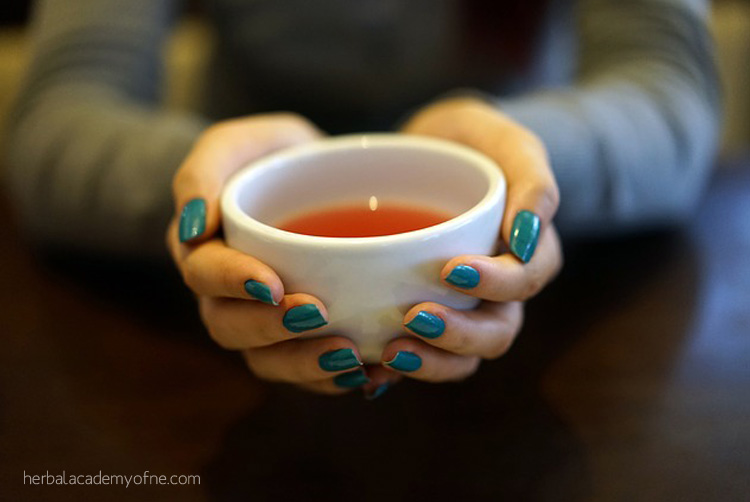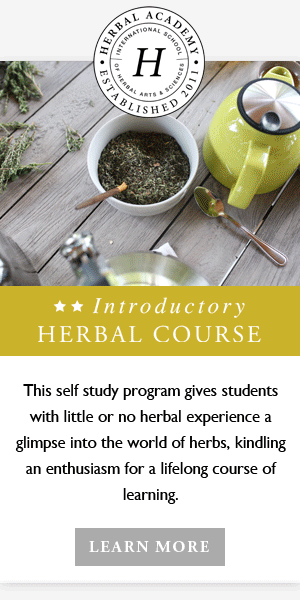
Ten Homemade Herbal Teas for Cold and Flu Season
The changes in the leaves, drops in temperatures, and pumpkin pie-everything are signals to me that it’s time to prepare for cold and flu season. Some of my favorite natural home remedies that I like to keep on hand during the cold and flu season (like my Homemade Elderberry Syrup or Cool Vibes Vapor Rub Jr. or HANE’s Quick & Simple Elderberry Cold Syrup) can be a bit time consuming to make and are better made beforehand. In the heat of the moment, it’s nice to have a simple, easy to make remedy that can help give some relief while recovering from a cold or the flu. Medicinal herbal infusions, also known as herbal tea, may provide a lot of relief for many cold and flu symptoms and some herbs may even help boost your immune system to help you kick your illness to the curb faster.
Herbal Infusions: Easy Cold and Flu Relief
If you asked me a few years ago how tea could help during an illness, I might have laughed and thought that you were joking. It’s just tea, right? Wrong! Drinking herbal infusions can have many healing benefits that may help you to heal faster and feel better! The difference in a medicinal herbal infusion and a tasty tea beverage, is primarily in the length of time the herbs are steeped. In general, medicinal herbal infusions are steeped for a much longer period of time to extract the healing benefits from the herbs, whereas a tasty tea beverage is steeped for a much shorter period of time to retain the perfect flavor of the beverage. Some of the benefits of drinking hot herbal tea while you are ill, are:
- Many herbs have medicinal properties that can help soothe specific ailments, such as marshmallow root for coughs and sore throats or valerian root for pain and relaxation.
- Some herbs have immune boosting properties, vitamins, and minerals that can help you to fight off an illness faster, such as elderberries/elderflower, echinacea, and rosehips.
- The action itself, of slowly drinking a hot steamy beverage while ill with a cold or the flu, has also been proven to help increase the movement of nasal mucus and clear a severely congested head.
- Drinking tea is also another method of getting the fluids you need to help your body fight off the illness. It’s very important to stay hydrated during any illness.

Ten Herbal Teas for Cold and Flu Season
All of these teas can be made with a pinch of stevia leaf to sweeten them, if you so choose! I like to add the juice of a lemon and a dash of honey to all of my own steamy cups of tea. The addition of raw unfiltered honey to your tea is also very beneficial to your illness and has even shown to be more effective than Sudafed in helping soothe a cough. According to Dr. Lawrence Rosen in Treatment Alternatives for Children, “In a comparison conducted on the effect of honey, dextromethorphan, and diphenhydramine on nightly cough and sleep quality in children and their parents. After studying 139 children, ages 24 to 60 months, researchers found honey to be more effective in controlling cough symptoms compared to conventional treatments. Additionally, honey-treated children slept more soundly through the night (Rosen, 2012).”
These recipes are not set in stone. You can substitute or add many of the herbs that you might have on hand to make your own cold and flu blend. I love to use peppermint, cinnamon, and ginger religiously in most of my own tea blends, regardless of what ailment I am focusing on. Not only are they antiviral and antiseptic but they also add a good deal of delicious flavor to the beverage. Some healing herbs don’t have the best taste and are easier to get down when their flavors are coverd with these tastier herbs.
- Hippy Cold Care Tea
This tea not only helps to boost immunities but has also been based upon an old folk remedy that was used to help reduce fevers.
– 1 part elderflower
– 1 part peppermint leaf
– 1 part yarrow flowers and leaf - Immune Boosting Tea
Elderberries are a well known immune booster, but rosehips are a lesser known one! Rich in Vitamin C, rosehips contain 40 times more vitamin C than lemons!
– 1 part dried elderberries
– 1 part rosehips
– ¼ part cinnamon chips
– ¼ part ginger root - High-C Immune Boosting Tea
This tea is great year around and even tasty over ice! Hibiscus with its lovely tart flavor and pretty red coloring, is rich in vitamin C, helping to boost your immunities. I really love to make this tea and serve it as a tea-lemonade!
– 1 part hibiscus
– 1 part rosehips
– ½ part lemongrass
– ½ part lemon peel
– ¼ part cinnamon chips - Headcase Headache Relief Tea
This tea is great for relieving headaches, easing tension, calming nausea, and even for helping aid in sleep.
– 1 part basil leaf
– 1 part lemonbalm
– ¼ part chamomile
– ¼ part lavender - Sore Throat Tea
Sore throats really benefit from an addition of honey and lemon juice to the tea! If you can stand it, the addition of a dash of cayenne pepper is also extremely beneficial at soothing a sore throat and helping to open up the sinuses.
– 1 part sage leaf
– ½ part licorice root or slippery elm
– ¼ part cinnamon chips
– ¼ part ginger root - No Nausea Tea
This tea is great for nausea, upset stomach, and indigestion.
– 1 part lemonbalm
– 1 part chamomile
– 1 part peppermint leaf
– ½ part dill leaf and seed - Cough-B-Gone Tea*
Mullein has long been used to help with coughs and other respiratory issues because of its antispasmodic and expectorant properties. The addition of honey to this tea is very helpful at soothing coughs!
– 1 part chamomile
– 1 part marshmallow leaf and flower
– 1 part mullein leaf - Bronchial Relaxer Tea*
Not only will the valarian root help to relax a deep spastic cough, but it’s also great at helping you to sleep so that you can fight the illness from the inside out.
– 1 part licorice root
– 1 part valerian root
– ¼ part cinnamon chips
– ¼ part ginger root - Fever Reducing Tea*
This tea has a time-tested history of helping to reduce fevers for children. Helping to sweat out the fever, this tea is a tasty option for both children and adults.
– 1 part catnip leaf
– 1 part elderflower
– 1 part spearmint leaf - SAD (Seasonal Affective Disorder) Pick-Me-Up Tea
At the end of an illness, when I have been stuck inside for a few days, I usually need a good pick-me-up to uplift my spirits! This tea is great for that!
– 2 parts St. John’s wort
– 1 part oatstraw
– 1 part lemonbalm
– 1 part spearmint
*Adapted from Rosemary Gladstar’ Herbal Medicine: A Beginner’s Guide.
Directions
- Combine herbs in a bowl and store in a sealed container when not in use.
- To Make a Medicinal Infusion – In a glass quart jar, pour boiling water over 4-6 Tablespoons herbal tea, filling the jar to the top.
- Allow to steep covered for 30-45 minutes.
- Strain herbs and enjoy! Be sure to take the time to breath in the steamy vapors of your medicinal tea while you are sipping it!
- You can refrigerate your excess infusion and heat it up to drink later.

This post was written by The Hippy Homemaker, Christina, who loves to share what she’s learning about green and eco-friendly living, natural health, aromatherapy, herbalism and more!
REFERENCES
Rosen, MD, Lawrence. (2012). Treatment Alternatives for Children. New York, New York: Alpha Books
Gladstar, Rosemary. (2012). Herbal Medicine: A Beginner’s Guide. North Adams, MA: Story Publishing
Buhner, Stephen Harrod. (2013). Herbal Antivirals: Natural Remedies for Emerging & Resistant Viral Infections. North Adams, MA: Story Publishing








